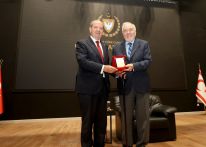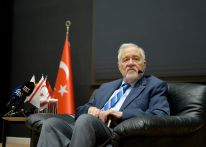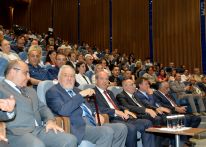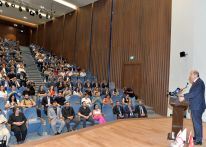“The Eternal Cause of the Turks: Conference on Cyprus” has been held at the Presidency
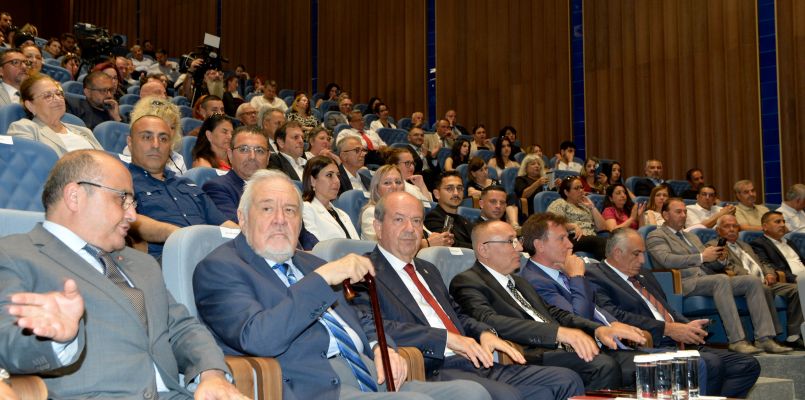
President Ersin Tatar: “We must learn from history. Adopting a naive approach to issues can be dangerous. It is essential to understand how ideological differences, religious divides, and national values have historically led to either conflict or cooperation.”
Photos
Ortaylı: “The Island of Cyprus has significant geostrategic importance. It has from ancient times been a destination even for the oldest ships in the Mediterranean.”
Doğanay: “Natural gas reserves are of strategic importance.”
The conference titled “The Eternal Cause of the Turks: Conference on Cyprus”, has been held under the auspices of the Presidency in cooperation with the Eurasian Strategic Research Foundation.
President Tatar met with Prof. Dr. İlber Ortaylı prior to the conference that was held at the Presidency on Thursday. The Ambassador of the Republic of Türkiye to Lefkoşa, Ali Murat Başçeri, was also present at the meeting.
Held at the Amphitheatre of the Presidency, the conference was attended by President Tatar, Ambassador Başçeri, Minister of Public Works and Transport Erhan Arıklı, Minister of National Education Nazım Çavuşoğlu, Minister of Finance Özdemir Berova, as well as members of parliament, representatives of various institutions, and invited guests.
President Tatar: “Understanding the past is key to shaping a sustainable future and crafting an informed vision.”
Addressing the conference, President Tatar stressed the “importance of understanding the Cyprus issue through a historical lens”, adding that it is “essential to understand how ideological differences, religious divides, and national values have historically led to either conflict or cooperation”. He added that “understanding what has transpired in similar regions over centuries is crucial for crafting an informed vision for a sustainable future”.
Referring to the shifting geostrategic and geopolitical dynamics in the eastern Mediterranean, President Tatar underlined the importance of the “Blue Homeland” and “Sky Homeland" doctrines, and cautioned against the “belief, by some, that people are brothers and will build a common future – which although seems to be idealistic, is in reality a naive viewpoint that can lead us into grave dangers. . . one only needs to look at the conflicts in the world and the past and present developments in Cyprus".
President Tatar, who paid tribute to Ortaylı as a “leading historian offering guidance by analysing the historical process in all its dimensions,” said: “Ortaylı is a leading historian, academic personality and professor of history, who is renowned for his frequent contributions regarding the Cyprus issue at conferences, press articles and television appearances. It is a great privilege and an honour for all of us to hear his insights at the new Presidential complex of the Turkish Republic of Northern Cyprus. I thank him for his participation in this conference.”
Ortaylı: “Intolerable incidents occurred in Cyprus whilst European states turned a blind eye”
In his speech, Prof. Dr. İlber Ortaylı stated that the attacks carried out by the Greek Cypriots against the Turkish Cypriot People in the 1960s in Cyprus “did not receive sufficient opposition and reaction” from the European public opinion. “At that time, intolerable incidents against Turkish Cypriot People were carried out, yet European states ignored them,” he said.
Ortaylı stated that due to the Greek Cypriot aspiration to unite Cyprus with Greece, the expulsion of Turkish Cypriots from the state apparatus of the partnership Republic of Cyprus in 1963, the attacks on the Turks of the Island and the coup d’etat in July 1974 by the Greek Junta, Türkiye, as one of the Guarantor powers, exercised her obligatory right and intervened in order to stop the bloodshed and bring peace to the Island. He added that “they have always associated the Island of Cyprus solely with Christianity and Greek culture”.
Highlighting Cyprus’s long standing history of "being home to diverse peoples and cultures", Ortaylı said: “The Island of Cyprus has significant geostrategic importance. It has from ancient times been a destination even for the oldest ships in the Mediterranean.”
He stressed that the “struggle in Cyprus continues to this day” and warned that “without a strong State and national presence, the past can easily be forgotten and lessons not learned”.
“Some historical events are never accepted,” he added. “However, if you have strength and a decisive response, they retreat. That’s why we must sit down, reflect, and never ignore historical reality”.
Doğanay: “Natural gas reserves are strategically significant.”
Also addressing the conference, President of the Eurasia Strategic Research Foundation, Murat Doğanay, stated that the “two State basis” was “complementing the Blue Homeland doctrine within the Cyprus-centred geopolitical framework,” adding that “these are not merely political propositions, but foundational pillars for the regional stability, energy strategy, and historical continuity of the Republic of Türkiye”.
Doğanay described Cyprus as “more than a geographical territory” —but as being a “geopolitical hub at the heart of the eastern Mediterranean”. He pointed out that international competition over energy resources has “transformed the defence sector of Türkiye and her maritime jurisdiction into a multi-dimensional strategic endeavour”.
Stating that “Blue Homeland is not merely a map. . .it is a vision encompassing security, sovereignty, and a sustainable future—with Cyprus being one of its most sensitive components”. He added that the approximately 122 trillion cubic feet of natural gas in Türkiye’s maritime zones in the eastern Mediterranean is of strategic importance both for the country’s energy independence and for Europe’s supply security. Doğanay highlighted that transporting gas from South Cyprus to Europe via liquefaction costs about $11 per unit, while using a pipeline through Türkiye would reduce the cost to about $6 -- marking a strategic shift for Europe, beyond just a technical detail.
“At this point, I wish to underline that the Turkish Republic of Northern Cyprus is not only a diplomatic entity but also an integral part of the energy, security, and foreign policy strategies of the Republic of Türkiye,” Doğanay said. “The TRNC serves as a critical balancing factor against proxy wars, energy rivalries, and military presence in the region,” he added.
He concluded by stating that the “purpose of the conference is to merge academic expertise with developments on the ground”, and “offering strategic vision to decision-makers in Ankara and Lefkoşa,” Doğanay said.


